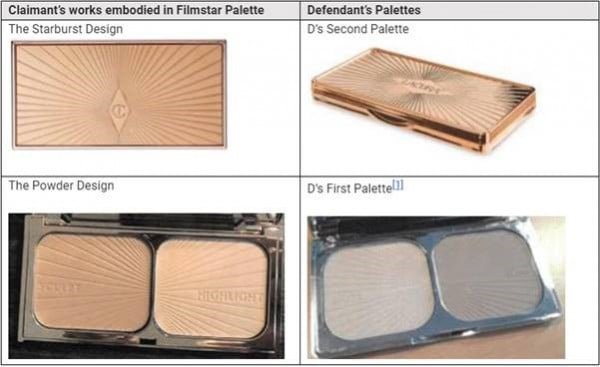Charlotte Tilbury wins copyright battle against Aldi
In a recent High Court decision, makeup artist to the stars Charlotte Tilbury (CT) has been successful in a copyright claim against the budget supermarket Aldi.
The claim related to makeup palettes. It was CT’s case that Aldi had started selling a replica of her famous Filmstar Bronze and Glow Palette. CT’s Palette had been on public sale for a recommended retail price of £49 since around 2013 and had generated sales of £12.9 million. In comparison, Aldi’s copycat version was retailed both online and in store for a price between £4.99 and £6.99 and approximately 20,248 units were sold producing sales in the region of £140,000. It was Aldi’s position that its product was only on sale for a short period during December 2018.
In essence, CT said that Aldi had infringed her copyright in regards to two artistic works. Firstly, what was described as the Starburst Design, which was the design on the lid of the packaging and secondly, the Powder Design, which was a design embossed into each of the two separate makeup powders contained within the packaging. The parties’ products were as follows:

It is without doubt that items such as make-up start out as an idea. The development of the product will involve inspiration, creativity, time and carefully thought on the part of the development team. Often, the end product has been months or even years in the making. The idea itself is not protectable in its own right; certain basic concepts must remain available for anyone to use. However, once an original idea is put down on paper or is made into something tangible, copyright may automatically arise to protect the original idea.
To benefit from copyright protection, a work must be “original” i.e. it must not be a copy of a pre-existing work and it must involve independent skill or labour. In relation to products such as make-up, copyright protection will generally be limited to their decoration or works involving a sufficient element of craftmanship. It is for these reasons that claiming copyright infringement in respect of mass produced 3D items has historically been quite difficult because the Courts have not viewed them as works of artistic craftmanship.
However, in this case, CT was able to rely on the Starburst design on its products. This meant that CT was able to show that its design was an artistic copyright work that had been substantially copied by Aldi. The Court’s decision means Aldi is now liable to pay CT damages and costs in respect of breach of copyright.
There are some interesting lessons that can be learnt from the Court’s decision as follows:
- Any company seeking to imitate or take inspiration from another’s products will need to be very careful about how they do so; and
- Brands need to pick their IP rights carefully. In this case, there was a good copyright claim and this was successful. However, an earlier claim for passing off (the wrongful act of misusing the “get up” or “look and feel” of a brand) was dropped presumably because CT’s legal team thought it was weak. Registered trade marks can be helpful but are difficult to obtain in relation to the shape of a product. Registered and unregistered design rights are often a neglected cause of action which are not pursued.
Our specialist intellectual property disputes team routinely advises on a broad range of disputes relating to copyright, trade marks, patents, confidential information and data protection. The team is also highly skilled at advising on design rights and reputation management issues and are regularly instructed by clients from the arts, media, textile and clothing sectors in the UK and internationally. If you need advice on copyright or other intellectual property infringements, please do not hesitate to contact a member of the team today.
